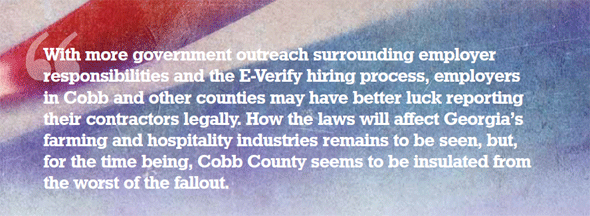Illegal immigration and immigration law reform have become increasingly important election-year topics with significant controversy attached. Georgia’s 2011 law, HB 87—which was inspired by Arizona’s strict 2010 immigration measure—is aimed at stopping illegal immigrants from taking jobs from U.S. citizens as well as ending taxpayer support for government contractors who hire illegal immigrants. The Atlanta metro area is constantly growing, and the issue of employment and the legal policies involved in ensuring employment is lawful are ever-present. Georgia has adopted pieces of Arizona’s immigration law, the constitutionality of which has been questioned on multiple occasions despite the Supreme Court’s recent ruling. Some counties and cities in Georgia, including Fulton County and the city of Chamblee, are having a hard time with the state’s year-old immigration law and have not been complying with E-Verify, a mandatory online database that employers must use to ensure their workers are legally able to work in the United States.
Cobb County, on the other hand, is ahead of the game when it comes to taking steps toward successful immigrant employment procedures. It was the first county government in Georgia to implement the Immigration and Customs Enforcement Mutual Agreement Between Government and Employers (IMAGE) and continues to demonstrate proper use of E-Verify. But even while Cobb is making these adjustments, updates and changes to the law are constantly ongoing. How do these new immigration employment procedures affect Georgia’s job climate, and what does it mean for Cobb County?
Arizona’s Controversial Law
In April 2010, Arizona Senate Bill 1070 was signed into law by Gov. Jan Brewer. The broadest and strictest anti-illegal immigration measure in recent U.S. history, the law includes what is known as the “show me your papers” treatment, which enables law enforcement to demand the citizenship papers of suspected offenders and grants the ability to detain them if papers are not present. The National Association for the Advancement of Colored People is petitioning to have the bill shut down completely, as they argue it invites racial profiling by law enforcement against any persons of color, which they maintain violates the 14th Amendment’s equal protection clause. Another controversy arose in late July when the American Civil Liberties Union of Arizona submitted a public records request to acquire thousands of emails that they claim prove this controversial immigration law is racially motivated. The emails are from the author of SB 1070, Arizona Senate President Russell Pearce, who has since been recalled.
Though the Supreme Court OK’ed it in June, many other groups have actively opposed the enforcement of the “show me your papers” treatment, including a coalition of civil rights groups, religious leaders and business organizations. Even while confirming the constitutionality of the law, the Supreme Court expressed hope that it can be enforced lawfully and harmoniously.
Georgia’s Year-Old Law
Many states, including Georgia, have adopted parts of Arizona’s law—meaning the Georgia police now have the authority to demand immigration documents from individuals they suspect of being in the country illegally and then detain them for possible violations. Arizona continues to draw controversy that could eventually affect the law’s status, which in turn would affect Georgia’s law. HB 87, which took effect on July 1, is part of the Georgia law that creates a new criminal offense (aggravated identity fraud) for anyone willfully using fraudulent documents to get a job. The author of HB 87 is State Rep. Matt Ramsey, and he explained to the Atlanta Journal-Constitution (AJC) that the goal of the bill was “to eliminate incentives for illegal aliens to cross into [Georgia]” and that he “will take legislative action if necessary to carry out our intent, which is to protect Georgia’s taxpayers from the social and economic consequences of illegal immigration.”
Despite the ever-changing climate surrounding this controversial law, compliance has been consistent in Cobb County. Joining forces with the U.S. Immigrations and Customs Enforcement (ICE), Cobb applied for 287(g) programs back in 2006, which team federal officials with local police to enforce immigration laws. Under section 287(g) of the Immigration and Nationality Act, ICE provides state and local law enforcement officers with the training and authority to identify, process and detain immigration offenders, when appropriate. This can happen at any time during their daily law-enforcement activities.
Sheriff Neil Warren of Cobb County, who was recently voted onto Fox News’ top 10 list of the nation’s toughest immigration sheriffs, felt strongly about implementing the 287(g) programs. “I started trying to get 287(g) in 2004 when I became sheriff,” he says. “It took me almost a year and a half, two years to get the agreement. We were the first in the state of Georgia, and at that time we were seventh or eighth in the country.” The sheriff says the program has helped to decrease the number of criminals in the county detention facility. “Before 287(g), at any given time we would have somewhere in the neighborhood of 500 to 600 foreign-born nationals booked in our facilities,” he explains.
“Right now we’re down to about 250.”
Immigration and Georgia Jobs
In 2011, a labor shortage in Georgia resulted in an estimated $140 million in agricultural losses and has vastly affected the hotel and restaurant industries. In June 2011, a survey of 230 Georgia farmers was conducted by Agriculture Commissioner Gary Black, the results of which showed that the farmers expected to need more than 11,000 workers to carry out the rest of the season after their illegally hired workers left Georgia—and not every farmer in the state responded to the survey.
Cobb County District 2 Commissioner Bob Ott, who pushed for the county to join the program, told The Augusta Chronicle that the goal isn’t to get people deported. “It’s all about jobs for the folks in Georgia and Cobb County,” he said. “It really comes down to just making sure that the limited number of jobs that are out there are going to the people that are entitled to have them.” A July 2011 Businessweek story reported that, in 2009, there were 425,000 illegal immigrants in Georgia, making up 4.3 percent of the state’s population. The Pew Hispanic Center estimated that 325,000 illegal immigrants held jobs in Georgia in 2010. Georgia’s unemployment rate is currently at 8.9 percent, above the national average of 8.2 percent.
The effect of immigration laws on jobs statewide has yet to be seen, since so much remains unresolved. Charles Kuck, past president of the American Immigration Lawyers Association and the managing partner of Kuck Immigration Partners LLC-The Immigration Law Firm, says the Supreme Court ruling sets up grounds for future lawsuits, and he expected a federal appeals court would rule Georgia’s illegal immigration law unconstitutional in August or September. “Already in Georgia under the Obama administration, anybody who’s arrested and brought to jail has their immigration status checked. HB 87 has nothing to do with that, that’s federal law, and that’s happening in Cobb County,” says Kuck. “There is no magic phone number to call from the side of the road to say, ‘Hey, is this guy who has a license legal, do you want him, do you want to hold him?’ So really this whole idea of ‘show me your papers’ is irrelevant. It’s absolutely irrelevant and will do nothing to enforce U.S. immigration law.”
Sheriff Warren stands by the 287(g) program over HB 87’s “show me your papers” portion as a solution to illegal immigration issues. “Right now I couldn’t tell you that HB 87 has done anything for law enforcement other than keep some folks that were hiring illegals for the cheap labor,” he says. “That may have kept them from committing a crime.”
Understanding E-Verify
E-Verify, part of HB 87, is a free online program employers must use after they have completed the I-9 worksheets for new employees to ensure they are legally able to work in the U.S. Many Georgia agencies have failed to comply with this key part of the state’s year-old anti-illegal immigration law, which puts them at risk of losing access to state loans and grants. This state funding helps cities and counties in Georgia maintain their jails, boost employment and encourage commerce. All but the smallest private employers and government agencies are required to use this federal work authorization program. In a recent investigation, the AJC found that certain areas and organizations in Georgia, including Chamblee, Sandy Springs and the DeKalb County Housing Authority, didn’t file the required reports to confirm that they and their contractors are using E-Verify.
Because of the way that state and federal records are kept, it is impossible to confirm that all private employers required to use E-Verify are doing so. The state has no way to check compliance because there is no money for performance audits. In addition, some local governments charged with enforcing the law do not fully understand how to follow it. Sandy Springs, one of the state’s largest cities with more than 94,000 residents, sent a letter this year to 6,700 businesses that included inaccurate information about the E-Verify requirement. “The state did no outreach with the cities and counties to tell them what to do and to get it done, there were no internal checks to be done, there was no way to reach out,” says Kuck. “This is what happens when you pass a bill and you have all this compliance and you have no funding with which to do it.”
More than 18,800 public and private employers in Georgia are enrolled in E-Verify according to U.S. Citizenship and Immigration Services (USCIS) records; however, state Labor Department officials told the AJC they cannot confirm they’re complying because the databases include different information, which eliminates the possibility of cross-checking. According to records from the state Department of Audits and Accounts, 1,176 of the 2,324 local and state government agencies did not file reports by the Dec. 31 deadline—numbers that may include employers who are exempt. City and county officials have blamed the missing reports on dozens of issues, from unfamiliarity with the law to heavy workloads. Stewart County, home to the state’s largest detention center for illegal immigrants, blamed staff turnover for their failure to file their report on time. “I don’t think anyone that worked on HB 87 believed there would be universal compliance in the relatively short time it has been in effect, given how sweeping and comprehensive the changes are in that law,” Ramsey told the AJC.
Adding to the inconsistency of the E-Verify filing is the fact that 620 agencies reported not having any public works contracts to report while the 488 agencies that did file had varying levels of thoroughness. Cobb County officials reported business with more than 120 contractors, while Fulton, the state’s most populous county, only identified one.
E-Verify’s Unintended Effect
One bit of fine print about the E-Verify law is that it requires companies that have more than 10 workers and fewer than 100 to use E-Verify. The law exempts scores of small cities from its requirements, but this exemption may be too broad. The exemption essentially says that government employers with fewer than two employees don’t have to comply with the E-Verify requirements. According to the Georgia Municipal Association (GMA), more than 80 cities in Georgia have companies and organizations with one or no employees, which caused the lawmakers to create the exemption. Others operate with the help of volunteers and contractors, and officials from the GMA said these contractors were not meant to be exempt from the E-Verify requirement.
Ramsey told the AJC that HB 87 went through numerous drafts in both the House and Senate in 2011. “I believe all contractors doing work on government projects in Georgia should be using E-Verify,” Ramsey said. “To the extent the law is being interpreted to the contrary, we will seek to make legislative revisions to ensure that intention is carried out in Georgia law.”
Ahead of the Game in Cobb
Commissioners in Cobb County recently approved IMAGE for the county’s government. IMAGE is conducted by the Department of Homeland Security to combat unlawful employment and reduce vulnerabilities, such as improper hiring procedures and fraudulent documents, that help illegal aliens gain employment. This program provides verification that every county employee has a legal right to work in the United States, and Cobb is the first county in the state to approve it. As part of the program, the USCIS provides education and training on proper hiring procedures, detection of fraudulent documents and the importance of avoiding discrimination in violation of the Immigration and Nationality Act. For employers, the main difference between IMAGE and E-Verify is that E-Verify is a free database you can use yourself, whereas IMAGE is an extra step beyond E-Verify that will help employers avoid fines if a violation of the immigration law has occurred.
For private employers, Kuck insists E-Verify is the better route than IMAGE. He is an E-Verify employer and says it is not hard to use. “IMAGE is run by ICE as kind of a glorified E-Verify program where ICE becomes your human resource department,” he says. “As a lawyer, I would never recommend an employer to enroll in the IMAGE program. You’re putting government in your hiring process. Directly. Daily. I thought government was supposed to be out of our lives.”
As recently as July, a federal appeals court in Atlanta rejected efforts aimed at shutting down programs that give Cobb County and state police immigration enforcement powers. In 2008, after employing 287(g), Cobb transferred more than 2,700 inmates to federal agents for deportation. Since 2006, more than 14,800 people have been deported or allowed to leave the country voluntarily as a result of Georgia’s five 287(g) programs in Cobb, Gwinnett, Hall and Whitfield counties. Sheriff Warren reports that 14 to 16 officers in Cobb have been ICE certified to participate in the 287(g) program. “It’s based on their performance and their leadership skills. The point of this is what I like to call investigative work,” he explains. “You have to have the experience of working in a jail, the experience of the booking procedure, the technology. We try to use some of our most experienced deputies that we feel will do the best job. Of course, the [training] ICE put them through is pretty intense and pretty in depth. It takes a good, experienced deputy to comprehend the training.”

Cobb Jobs
Cobb holds more than 7 percent of all jobs in Georgia, and a new study done by Georgia State University (GSU) estimates that 31 percent of Cobb jobs are premium high-paying jobs. Released by the Fiscal Research Center of the Andrew Young School of Policy Studies, the study uses the latest data reported in the Georgia Department of Labor’s Quarterly Census of Employment and Wages to show the distribution, type and quality of jobs weighed. The premium job category is defined as having an annual average wage of more than $50,000.
The city of Marietta alone contains 1.42 percent of all jobs in Georgia and 18.1 percent of all Cobb County jobs. Fulton County has the highest percentage of jobs in Georgia, with 14.83 percent, and Cobb County is in second place with 7.19 percent. According to the GSU study, premium jobs make up 31 percent of the Cobb workforce, while mid-range and low-paying jobs total 33 and 36 percent, respectively. When analyzing the workforce makeup of Cobb, Kuck feels HB 87 is not needed here of all places. “Do you really think somebody who’s undocumented is applying for a job with Cobb County? [HB 87] is a solution without a problem, and therefore it’s meant for political purposes only,” he says.
The outcome of Georgia’s immigration law is still in a state of flux as legal debates and lawsuits over the constitutionality of HB 87 and the 287(g) programs continue, but it seems at the very least that E-Verify is here to stay. With more government outreach surrounding employer responsibilities and the E-Verify hiring process, employers in Cobb and other counties may have better luck reporting their contractors legally. How the laws will affect Georgia’s farming and hospitality industries remains to be seen, but, for the time being, Cobb County seems to be insulated from the worst of the fallout.

















